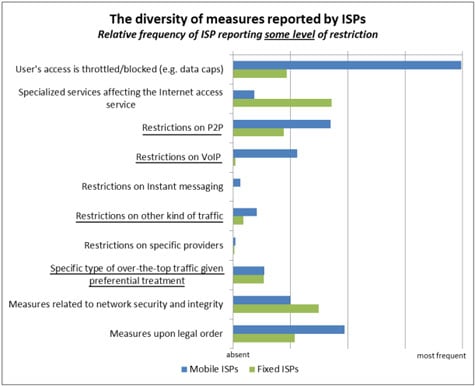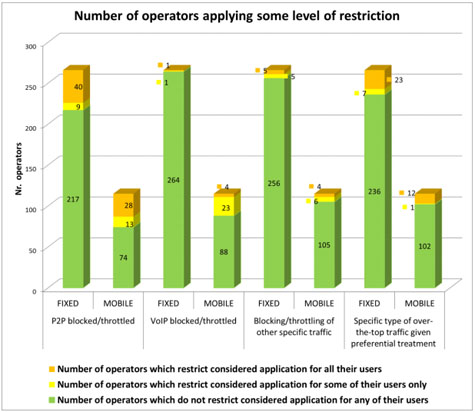TorrentFreak Email Update |
- Megaupload Demands Return of Millions of Dollars From U.S. Govt.
- Megaupload Asks Court to Dismiss The Criminal Case
- EU Report Reveals P2P Traffic Interference By ISPs
| Megaupload Demands Return of Millions of Dollars From U.S. Govt. Posted: 31 May 2012 02:27 AM PDT
The motion, which “challenges the scope of pretrial restraint of assets”, is running in parallel with yesterday’s general motion to dismiss, just in case the former should be declined. It also gives us an interesting flavor of the nature of Megaupload’s defense should the case go to full trial. As previously reported, the US indictment claims that Megaupload caused $500m in losses to copyright holders while generating revenue for itself in excess of $175m. In addition to $67m already seized, the U.S. Government is seeking criminal forfeiture of at least $175m, an amount challenged by Megaupload. “This represents the total revenues generated by Megaupload during its entire corporate existence,” the motion begins. “Thus, the premise of the Government's forfeiture request is that Megaupload never earned a single penny that was not criminal under U.S. law — whether, say, from a non-infringing use of its service, or from use that occurred wholly outside the United States and beyond reach of U.S. law, or even from an infringing use within the United States as to which Defendants nonetheless qualify for a statutory safe harbor or lacked requisite criminal intent.” Considering the high probability that at least some of the money generated by Megaupload was from entirely legal means (unless every single Megaupload user was engaged in criminal copyright infringement), assets should be released so that the defendants can pay to mount a defense, their legal team argues. Currently, no-one conducting Mega’s expert defense is getting paid. The motion continues by detailing what the defense believes is the key to undermining the whole case – claims of secondary copyright infringement against Megaupload (i.e holding the company responsible for the actions of its users) can’t lead to criminal liability. Indeed, only this week New Zealand Judge David J. Harvey made his opinion known, stating that in lacking “statutory support for its unprecedented effort to criminalize secondary copyright infringement, the Government has reached beyond the pale of the law.” The motion adds that federal criminal liability is created by statute, and no statute imposes criminal liability for secondary copyright infringement. “Congress did not contemplate that service providers such as these Defendants might be imprisoned based on uncodified theories of secondary liability that are still evolving in the civil context, as though those amounted to established federal crimes,” Dotcom’s lawyers write. In addition to being held secondarily liable, there are various allegations of direct infringement being leveled at the defendants. For example, one involves Kim Dotcom allegedly uploading a single 50 Cent track, another with Finn Batato doing the same with a Louis Armstrong song. However, Dotcom’s lawyers note that these allegations contain zero factual information from which the defendants could prepare a defense. Whose copyrights were infringed? How and when did the alleged infringements occur? The list goes on. “The Government has attempted to make out an all-encompassing case of an alleged criminal copyright conspiracy without bothering to allege concrete specifics of the actual “It has attempted to build one of ‘the largest criminal copyright cases ever brought by the United States’ out of conclusory ipse dixit, reciting statutory verbiage and nothing more.” In the indictment the U.S. makes much of the “rewards program” operated by Megaupload, claiming that such rewards encouraged users to upload infringing material. The defense see things somewhat differently. “Particularly in the context of this case, where it can be stipulated that Megaupload's “If the Government believes that every such business model is inherently and pervasively criminal because it may enable copyright infringement along with other misuse, then it should say as much, so that everyone is on notice and this Court can take due account. If, on the other hand, the Government believes that this business and these Defendants specially set out with intent to perpetrate copyright infringement, it is conspicuously bereft of corresponding facts.” The motion continues by stating that Megaupload had “substantial non-infringing uses” and had protections under the DMCA since it complied with copyright holder takedown requests by removing millions of links to allegedly infringing material. “Megaupload negotiated with numerous major rights holders, including the Recording Industry Association of America, the Motion Picture Association of America, Disney, Warner Brothers, and Universal Pictures, to grant them full access to directly remove any active link to infringing material,” Dotcom’s lawyers note. Furthermore, even if the claims against Megaupload had merit, they would still be geographically restrained, Dotcom’s team writes. “Megaupload was a non-U.S. company whose activities mostly occurred overseas and whose users were mostly located overseas. The laws of the United States do not apply to overseas locations and operations absent contrary prescription by Congress.” The motion, which runs to 45 pages, is somewhat of a tour de force from a legal team co-ordinated by Ira Rothken of the Rothken Law Firm in California. Its contents could yet provide the biggest copyright-related upset the U.S. has ever seen. Source: Megaupload Demands Return of Millions of Dollars From U.S. Govt. |
| Megaupload Asks Court to Dismiss The Criminal Case Posted: 30 May 2012 02:10 PM PDT
The authorities seized domain names, servers and personal belongings, and asked for the extradition of the defendants who were all arrested abroad. Since then, Kim Dotcom and his colleagues have been fighting against extradition in New Zealand. Today, the focus is shifting to the U.S. case. Megaupload’s lawyers just filed a motion to dismiss at the District Court for the Eastern District of Virginia. Their argument is simple. The U.S. authorities failed to serve Megaupload as is required in a criminal case. Because of this failure and the fact that the company was effectively put out of business, Megaupload’s due process rights have been violated. To claim a due process violation Megaupload has to shows that a liberty or property interest which has been interfered with by the State and that the procedures attendant upon that deprivation were constitutionally sufficient. According to Megaupload’s lawyers this is certainly the case here. “Both prongs of the procedural due process test are plainly met here. The Government has seized Megaupload's property and domain name, ruined its reputation, and destroyed its business pursuant to an indictment which is fatally flawed as a jurisdictional matter. Megaupload now finds itself in a state of abeyance, with no end in sight,” they write. “As a result of the Government's inability to properly serve the summons on Megaupload, this Court lacks jurisdiction over the company. In the absence of effective service of process, criminal proceedings against Megaupload cannot commence, and as the Court has aptly noted, we ‘frankly don't know that we are ever going to have a trial in this matter’." Megaupload’s legal team therefore concludes that, “Megaupload is thus deprived of any procedure to clear its name or recoup its property, in clear violation of its due process rights.” The crucial issue in the motion to dismiss is that Megaupload was never served. The origin of this problem is not merely a matter of oversight. Megaupload's lawyer Ira Rothken previously noted that unlike people, companies can't be served outside US jurisdiction. If this issue indeed prevents Megaupload from being tried in the US, it would be a blunder of epic proportions. And the fact that District Court Judge O’Grady previously acknowledged that this “issue” warrants further investigation, suggests that the motion filed by Megaupload could be the beginning of the end for the Megaupload case. Source: Megaupload Asks Court to Dismiss The Criminal Case |
| EU Report Reveals P2P Traffic Interference By ISPs Posted: 30 May 2012 06:49 AM PDT
The report was initiated in 2011 following requests from the European Commission addressed to BEREC, the Body of European Regulators of Electronic Communications. The aim was to gather information relating to the net neutrality debate, specifically regarding actions taken by ISPs to hinder, throttle, block or degrade Internet traffic. A questionnaire was sent to out to ISPs across Europe and in the end responses from a total of 381 ISPs were considered, 266 ‘fixed line’ ISPs (140 million subscribers) and 115 mobile operators (200 million subscribers). Among other things they were asked about their traffic management practices in respect of a range of objectives including preserving quality of service, contractual agreements with customers, network security, and other measures required by legal order.  Perhaps unsurprisingly the most frequently reported restrictions outside simple contractual data-capping concerned the blocking and/or throttling of peer-to-peer and VoIP traffic. A total of 49 fixed-line ISPs reported interfering with P2P, as did 41 mobile operators. While the restrictions affect at least 20% of all subscribers, the report notes that the impact on end users can vary. Some ISPs restrict all of their users, some just a percentage. Others restrict traffic during certain times of the day, while some have contractual restrictions that are not necessarily enforced technically.  Overall, in the fixed-line broadband market at least 21% of users are affected by P2P restrictions, either technically or by clauses in their contracts. In the mobile market that figure is 36%. When it comes to VoIP related restrictions, at least 21% of the mobile market faces restrictions with the possibility of an additional 18% depending on conditions. The findings of the study will be used in the ongoing Open Internet debate in Europe. Earlier this year the Netherlands was the first country to sign Net Neutrality principles into law, which would restrict the use of P2P-throttling by ISPs. In the European Parliament the Greens are proposing to guarantee Net Neutrality in the rest of Europe too. The full report titled BEREC findings on traffic management practices in Europe can be downloaded here (pdf) Source: EU Report Reveals P2P Traffic Interference By ISPs |
| You are subscribed to email updates from TorrentFreak To stop receiving these emails, you may unsubscribe now. | Email delivery powered by Google |
| Google Inc., 20 West Kinzie, Chicago IL USA 60610 | |


 In addition to filing a general
In addition to filing a general 
 Hundreds of ISPs all over the world limit and restrict BitTorrent and other peer-to-peer traffic on their networks, and Europe is no exception. A new EU report sheds light on how common these practices are.
Hundreds of ISPs all over the world limit and restrict BitTorrent and other peer-to-peer traffic on their networks, and Europe is no exception. A new EU report sheds light on how common these practices are.
No comments:
Post a Comment